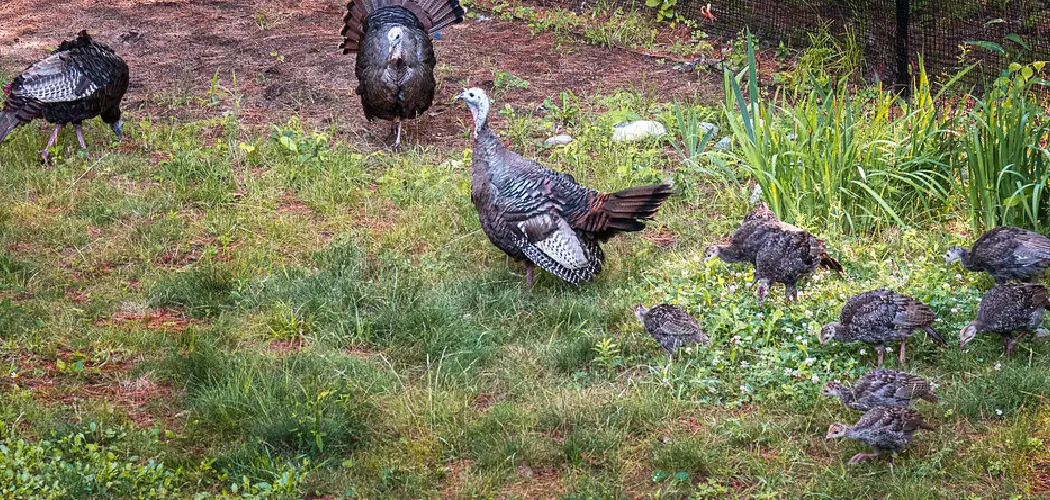Raising turkeys in your backyard can be a fun and rewarding experience. These majestic birds are not only great for Thanksgiving dinner, but they also make excellent pets. However, it’s important to understand that raising turkeys requires commitment and responsibility.
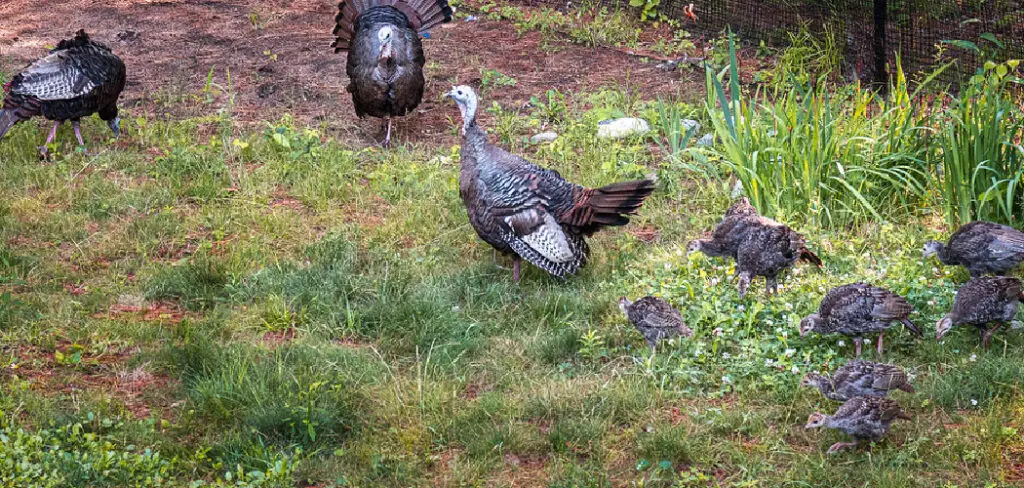
In this guide, we will walk you through the essential steps of how to raise turkeys in your backyard. If you follow these steps, you will have healthy and happy turkeys in no time. So let’s get started!
Step-by-step Guidelines on How to Raise Turkeys in Your Backyard
Step 1: Choosing the Right Breed
The first step in raising turkeys is choosing the right breed for your backyard. Turkeys come in different sizes, colors, and temperaments, so it’s crucial to research and select a breed that fits your needs. Some popular breeds for backyard farming include Bourbon Red, Narragansett, and Broad-Breasted White.
When selecting a breed, consider factors like their temperament, egg-laying ability (if you want to raise turkeys for eggs), and meat production. Also, make sure the breed is suitable for your climate.
Step 2: Preparing Your Backyard
Once you have chosen a breed, it’s time to prepare your backyard for your turkey flock. Turkeys require plenty of space to roam and forage, so make sure your backyard has enough room for them. A rule of thumb is to allow 50 square feet per turkey.
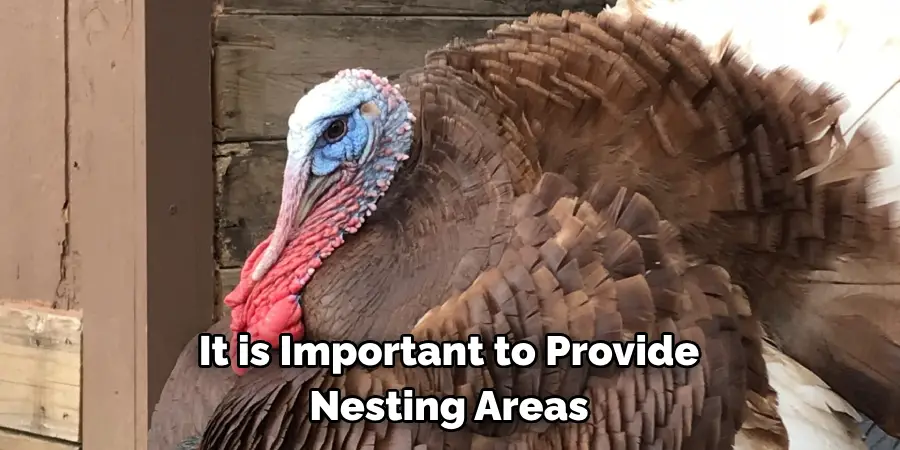
Next, you need to provide shelter for your turkeys. A simple coop will do, as long as it’s secure from predators and provides protection from harsh weather conditions.
Lastly, turkeys love to scratch and peck, so it’s essential to have a large outdoor area with access to grass and bugs for them to feed on.
Step 3: Feeding Your Turkeys
Turkeys are omnivores and will eat anything from insects and seeds to small rodents. However, they also require a balanced diet of protein, grains, vitamins, and minerals. You can either purchase turkey feed or make your own by combining grains, seeds, and protein sources like fish meal or soybean meal.
It’s also essential to provide your turkeys with fresh water at all times. Make sure to clean and refill their waterers daily to prevent the spread of disease.
Step 4: Caring for Your Turkeys
Proper care is crucial for the health and well-being of your turkeys. Regularly check for signs of illness or injury, and provide them with a clean and comfortable living environment. It’s also important to trim their nails and beak regularly to prevent overgrowth.
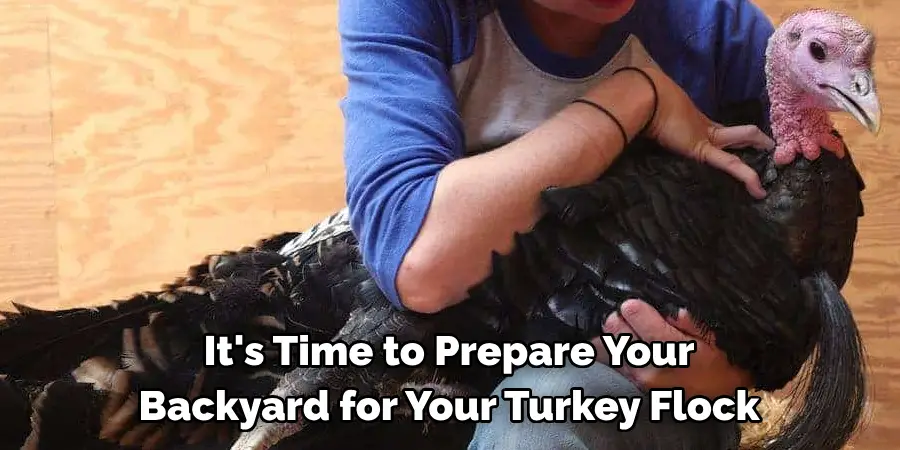
Turkeys are social birds, so it’s best to raise them in a flock. Make sure to introduce new turkeys slowly and monitor their interactions to prevent aggressive behavior.
Step 5: Harvesting and Utilizing Your Turkeys
Once your turkeys reach the appropriate weight (around 20-25 pounds), it’s time to harvest them. This process should be done humanely and quickly. If you’re unsure how to do it, consult a professional or experienced turkey farmer.
After harvesting, you can utilize different parts of the turkey for various purposes. The meat can be used for cooking, and the feathers can be used for crafts or sold. If you’re raising turkeys for eggs, make sure to collect them regularly.
Following these steps, you can successfully raise turkeys in your backyard. It’s a fulfilling and enjoyable experience that will provide you with delicious meat and possibly some feathered friends. Remember to always research and consult with experts for any questions or concerns along the way. Happy turkey raising!
Additional Tips and Tricks to Raise Turkeys in Your Backyard
1. If you are planning to raise turkeys in your backyard, one of the most important things to keep in mind is that they require proper shelter. The shelter should be spacious enough for the turkeys to move around freely and should also protect them from harsh weather conditions.
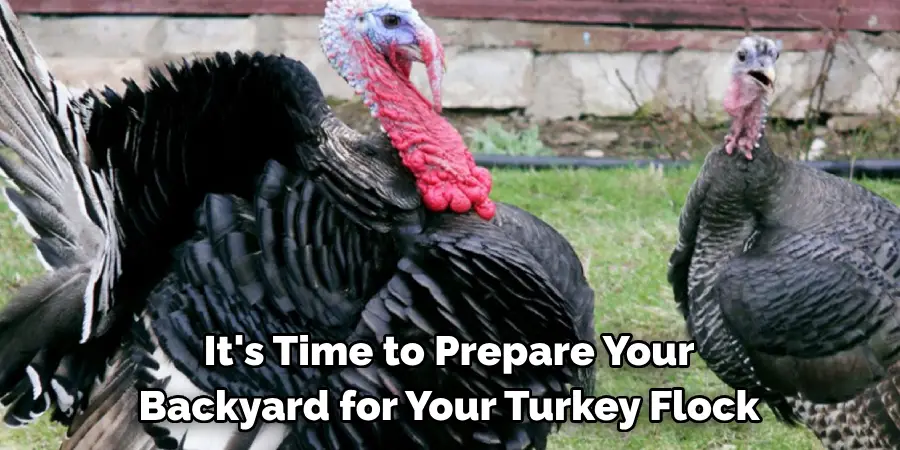
2. While turkeys are relatively hardy birds, it is still important to provide them with a balanced diet. Make sure to provide them with a good quality turkey feed that is specifically formulated for their nutritional needs. Additionally, you can also supplement their diet with fresh fruits and vegetables.
3. It is recommended to keep a close eye on your turkeys’ health and behavior. Any changes in their appearance or behavior could be a sign of illness or stress. In such cases, it is best to consult a veterinarian for proper diagnosis and treatment.
4. Turkeys are social animals and thrive in groups, so it is best to keep at least two or more turkeys together. However, make sure that there is enough space for each turkey to establish their own territory.
5. Providing your turkeys with access to fresh water at all times is crucial for their health and well-being. Make sure to clean their water source regularly to prevent the growth of bacteria.
6. It is important to have a designated area for your turkeys to roam and graze in your backyard. This not only provides them with exercise but also allows them to forage for insects, seeds, and other natural sources of food.
7. Consider providing some form of entertainment for your turkeys, such as hanging toys or objects for them to peck at. This can help prevent boredom and keep them mentally stimulated.
8. During breeding season, it is important to provide nesting areas for female turkeys. This can be as simple as a box filled with clean straw or hay.
9. Keep an eye out for potential predators in your area and take necessary precautions to protect your turkeys. This could include installing fencing or using scare tactics to deter predators.

10. Finally, always remember that raising turkeys requires dedication and commitment. Be prepared to spend time with your turkeys daily, providing them with proper care and attention.
With these additional tips and tricks, you can ensure a successful and enjoyable experience of raising turkeys in your backyard. Happy turkey farming! So, keep these tips in mind and enjoy your journey of raising turkeys! Remember to always provide them with love and care, as they are wonderful birds that can bring joy and companionship to any backyard. Good luck!
Things You Should Consider to Raise Turkeys in Your Backyard
1. The first thing to consider when raising turkeys in your backyard is the space you have available. Turkeys require a large amount of space to roam, so make sure your backyard can accommodate their size.
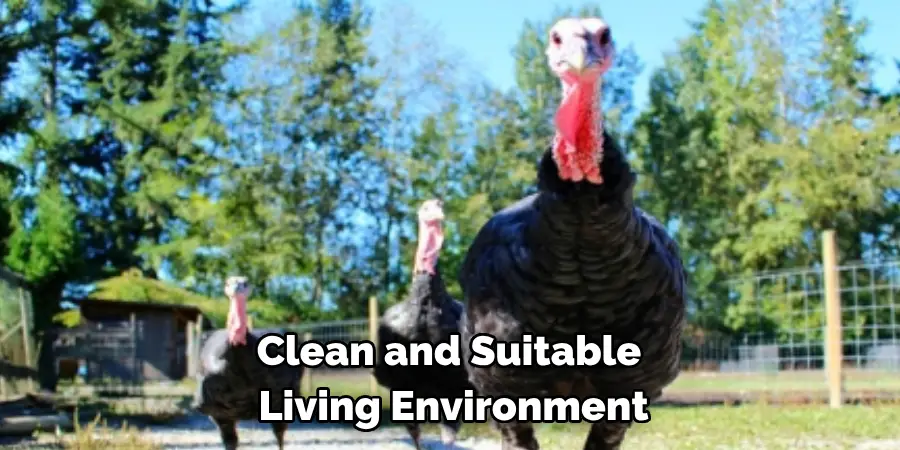
2. It’s important to provide shelter for your turkeys, especially during extreme weather conditions. This could be in the form of a coop or shed that is well-ventilated and provides protection from predators.
3. Feeding your turkeys a well-balanced diet is crucial for their health and growth. This includes grains, fruits, vegetables, and protein sources such as insects or worms. Make sure to provide fresh water at all times as well.
4. Speaking of predators, it’s important to take measures to protect your turkeys from potential threats such as coyotes, raccoons, and even neighborhood dogs. This could include installing fencing or using guard animals such as dogs or llamas.
5. Another consideration is the noise level of your turkeys. While they may not be as loud as roosters, they can still make quite a bit of noise, especially during mating season. Be sure to check with your neighbors before raising turkeys in your backyard.
6. Keep in mind that turkeys are social creatures and do best when raised in a group. It’s recommended to have at least three turkeys, as they can become stressed and aggressive if kept alone.
7. Before bringing home your turkeys, it’s important to research the specific breed you are interested in. Different breeds have different characteristics and may require different care.
8. Regular grooming and health checks are essential for maintaining the well-being of your turkeys. This includes trimming their nails, checking for parasites, and monitoring their weight.
9. Lastly, it’s important to consider the regulations and permits required for raising turkeys in your area. Some cities or neighborhoods may have restrictions on keeping poultry in residential areas, so be sure to check with your local government before starting your turkey-raising journey.
Following these considerations and providing proper care for your turkeys will ensure a happy and healthy flock in your backyard. Enjoy the benefits of farm-fresh eggs, fertilizer for your garden, and the joy of raising these fascinating birds. Happy turkey-raising!
Health Maintenance and Disease Prevention Tips for Raising Turkeys in Your Backyard
1. Provide Clean and Suitable Living Conditions:
Just like any other animal, turkeys need a clean and suitable living environment to thrive. This means regularly cleaning their living space, providing adequate ventilation, and ensuring that the space is free of any potential hazards. Make sure to also provide enough space for your birds to move around and exercise. If possible, allow them to have access to outdoor areas where they can graze and forage.
2. Proper Nutrition:
A balanced and nutritious diet is essential for the health of your turkeys. Make sure to provide a high-quality commercial feed specifically formulated for turkeys. Additionally, supplement their diet with fresh fruits and vegetables, grains, and protein sources such as mealworms or crickets. It’s important to also ensure that your turkeys have access to clean and fresh water at all times.
3. Vaccinations:
Just like any other livestock, turkeys require vaccinations to protect them from common diseases such as avian influenza and Newcastle disease. Consult with a veterinarian to determine the appropriate vaccination schedule for your flock. It’s important to also practice good biosecurity measures to prevent the spread of diseases.

4. Regular Health Check-ups:
Regular health check-ups are essential for maintaining the overall health and well-being of your turkeys. This can help identify any potential health issues early on, allowing for prompt treatment and prevention of further complications. Consult with a veterinarian if you notice any changes in your turkeys’ behavior, appetite, or appearance.
5. Parasite Control:
Parasites such as worms and mites can cause serious health issues for turkeys if left untreated. It’s important to regularly check for signs of parasites and implement a parasite control program as needed. This may include using dewormers and treating the living space with appropriate products. This will help keep your turkeys healthy and prevent any potential outbreaks.
6. Proper Handling and Transport:
When handling turkeys, it’s important to be gentle and avoid stressing them out. This can lead to health issues such as respiratory problems or injuries. When transporting turkeys, make sure to provide adequate ventilation and keep travel time to a minimum. If possible, avoid transporting turkeys during extreme weather conditions.
7. Potential Hazards:
Make sure to regularly inspect your turkeys’ living space for any potential hazards that could harm them. This includes checking for sharp objects, toxic plants, and other items that can be ingested or cause injuries. It’s also important to protect your turkeys from predators by using fencing or other deterrents.
8. Monitoring and Record-Keeping:
Keep track of your turkeys’ growth, behavior, and overall health by regularly monitoring them. This can help identify any issues that may require attention. Additionally, keeping records allows you to track vaccinations, treatments, and any changes in your living environment. This information can be valuable when consulting with a veterinarian or when making management decisions for your flock.
Following these tips can help ensure the health and well-being of your turkeys, leading to a happy and thriving flock. Remember to always consult with a veterinarian for specific advice and recommendations for your particular flock. With proper care and maintenance, raising turkeys in your backyard can be a rewarding experience. So, be patient, observe closely, and enjoy the process of raising these fascinating birds! Happy turkey raising!
Addressing Challenges and Troubleshooting for Raising Turkeys in Your Backyard

1. Health Issues:
Turkeys are prone to various health issues, especially when raised in backyard settings. Some of the common health concerns that turkey owners may face include respiratory infections, parasites, and injuries. It is important to be vigilant and regularly observe your turkeys for any signs of illness or injury.
To prevent health issues from arising in the first place, it is crucial to provide your turkeys with a clean and well-maintained living environment. This includes regularly cleaning their coop or shelter, providing fresh food and water, and keeping the area free from pests.
2. Predators:
Another challenge that backyard turkey owners may face is keeping their birds safe from predators. Turkeys are easy targets for a variety of predators, including dogs, cats, raccoons, and even larger birds like hawks.
To protect your turkeys from predators, it is important to have a secure coop or shelter for them to retreat to at night. This should be built with strong materials and have a lockable door. It is also helpful to have a fence around the perimeter of your turkey’s living area. You can also use scare tactics, such as placing shiny objects or noise-making devices near the coop to deter predators.
3. Aggression:
Turkeys are social animals and usually get along well with each other. However, they can become aggressive towards one another, especially during breeding season or if there is overcrowding in their living space.
To prevent aggression among your turkeys, it is recommended to have a spacious living area for them and not overcrowd the space with too many birds. It is also important to provide enough food and water sources to prevent competition among the turkeys.
4. Egg Production:
One of the main reasons people raise turkeys in their backyard is for their eggs. However, some turkey breeds may not lay as many eggs as others, and production can also decrease due to various factors such as stress or age.
To maximize egg production, it is important to choose a breed that is known for laying a good number of eggs. You should also provide your turkeys with a balanced and nutritious diet, plenty of fresh water, and a comfortable living environment.
5. Fertility Issues:
If you have a breeding pair of turkeys, fertility issues may arise. This can lead to unsuccessful hatching or low hatch rates. Fertility problems can be caused by various factors such as aging, health issues, or improper nutrition.
To prevent fertility issues, it is important to regularly check the health of your turkeys and provide them with a balanced diet that includes enough protein and essential vitamins. You should also make sure the breeding pair is not too closely related, as this can lead to genetic issues.
By being aware of these potential challenges and taking preventive measures, you can ensure a healthier and more successful backyard turkey-raising experience. It is also important to consult with a veterinarian if you notice any concerning health or behavioral issues with your turkeys. With proper care and attention, turkeys can thrive in a backyard setting and provide their owners with delicious eggs and companionship. Keep learning about turkey care and don’t hesitate to reach out for advice or support from fellow turkey owners or experts in the field.
Conclusion
Now you know how to raise turkeys in your backyard and the benefits that come with it. Not only are you able to provide healthy and delicious meat for your family, but you also get to enjoy the process of raising these intelligent and social birds.
However, keep in mind that raising turkeys requires dedication, time, and effort. Proper housing, nutrition, and health care are crucial in ensuring the well-being of your turkeys. It’s also important to consider local regulations and ordinances for raising livestock in your area.
But with the right knowledge and resources, raising turkeys can be a rewarding and enjoyable experience. So why not give it a try? You might just discover a new passion and a delicious source of food right in your backyard. Good luck!
About
Outdoor Fixes is a distinguished figure in the world of Diy design, with a decade of expertise creating innovative and sustainable Diy solutions.
His professional focus lies in merging traditional craftsmanship with modern manufacturing techniques,
fostering designs that are both practical and environmentally conscious. As the author of diy,
outdoorfixes delves into the art and science of outdoorfixes-making, inspiring artisans and industry professionals alike.
Education RMIT University
(Melbourne, Australia) Associate Degree in Design (Outdoor Fixes) Focus on sustainable design, industry-driven projects,
and practical craftsmanship. Gained hands-on experience with traditional and digital manufacturing tools, such as CAD and CNC software.
Nottingham Trent University
(United Kingdom) Bachelor’s in outdoorfixes.com and Product Design (Honors) Specialized in product design with a focus on blending creativity with production
techniques. Participated in industry projects, working with companies like John Lewis and Vitsoe to gain real-world insights.
Publications and Impact
In diy, Outdoor Fixes his insights on indoor design processes, materials, and strategies for efficient production.
His writing bridges the gap between artisan knowledge and modern industry needs, making it a must-read for both budding designers and seasoned professionals.

